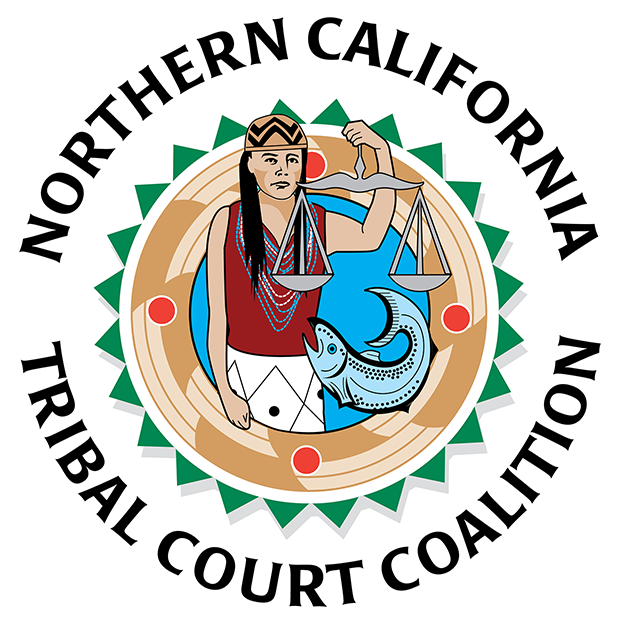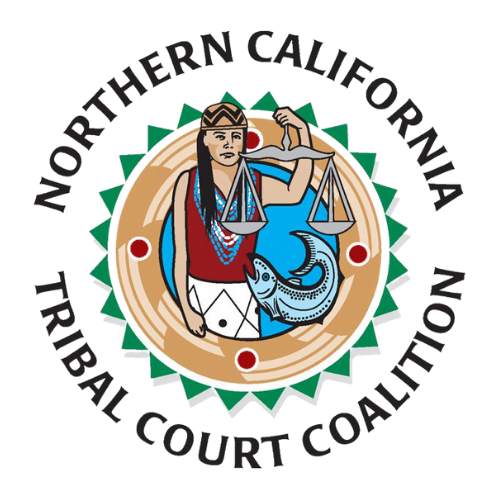
Position announcement
- Published in Above the fold, Employment Opportunities
Northern California Tribal Court Coalition Receives $50000 Award from The Association of Tribal Archives, Libraries, and Museums
Eureka, CA – Northern California Tribal Court Coalition received a $50000 grant through the Association of Tribal Archives, Libraries, and Museums (ATALM) American Rescue Plan: Humanities Grants for Native Institutions. This grant opportunity is intended to help Native Cultural Institutions to recover from the COVID-19 pandemic and provide humanities programming to their communities. Funds were provided by the National Endowment for the Humanities (NEH) as part of the American Rescue Plan Act of 2021 passed by the U.S. Congress.
Funds support the Weaving Wellness: Connecting the Humanities and Healing Project that will support an intertribal project that uses Indigenous humanities content to support healing for victims of domestic violence. Collaborating with Indigenous focus groups, tribal advocates, and victim service providers, NCTCC will identify, collect, and curate a collection of identity-based, cultural wellness materials so that Native victims of violence, their families, and their advocates can access culturally appropriate methods of trauma recovery, healing, and wellness. Tribes are the Bear River Band of the Rohnerville Rancheria; Cher-ae Heights Indian Community of the Trinidad Rancheria; Tolowa Dee-ni’ Nation; Yurok Tribe; Karuk Tribe; and Hoopa Valley Tribe.
“COVID-19 hit Tribal communities particularly hard. The pandemic is not only responsible for the loss of culture keepers, Native language speakers, elders, and government leaders, but also the closure of cultural institutions, furloughed staff, and reduced programming,” said ATALM President Susan Feller. “This opportunity will provide much-needed financial support and create humanities-based programs that bring cultural practitioners and the public together in a dialogue that embraces the civic and cultural life of Native communities.”
Northern California Tribal Court Coalition was selected by an independent Peer Review Committee and is one out of 84 awardees to receive funding. Other awardees representing 25 states include Tribal governments and Native nonprofit organizations, as well as higher education institutions and non-native nonprofit organizations working in partnership with state or federally recognized tribal entities. A total of $3.26 million was granted. A list of grantees is available at www.atalm.org
“The National Endowment for the Humanities is grateful to the Association of Tribal Archives, Libraries, and Museums for the association’s important work in administering American Rescue Plan funding to help Native American cultural institutions recover from the pandemic,” said NEH Chair Shelly C. Lowe (Navajo). “These grants provide valuable humanities resources to tribal communities and represent a lifeline to the many Native heritage sites and cultural centers that are helping preserve and educate about Indigenous history, traditions, and languages.”
###
ABOUT NORTHERN CALIFORNIA TRIBAL COURT COALITION
NCTCC is a collaboration of the Tribal Courts of Bear River Band of Rohnerville Rancheria, Hoopa Valley Tribe, Karuk Tribe, Tolowa Dee-ni’ Nation, Trinidad Rancheria, and Yurok Tribe. NCTCC is a 501(c)(3) organization chartered under the laws of the Hoopa Valley Tribe and the State of California. NCTCC’s mission is to Promote and Strengthen Tribal Justice Systems to Restore Balance and Order in our Communities, While Honoring Sovereignty and Cultural Values.

ABOUT THE NATIONAL ENDOWMENT FOR THE HUMANITIES
Created in 1965 as an independent federal agency, the National Endowment for the Humanities supports research and learning in history, literature, philosophy, and other areas of the humanities by funding selected, peer-reviewed proposals from around the nation. Additional information about the National Endowment for the Humanities and its grant programs is available at: www.neh.gov.

ABOUT THE ASSOCIATION OF TRIBAL ARCHIVES, LIBRARIES, AND MUSEUMS
The Association of Tribal Archives, Libraries, and Museums (ATALM) is an international association dedicated to preserving and advancing the language, history, culture, and lifeways of Indigenous peoples. Founded in 2010, ATALM maintains a network of support for Indigenous cultural programs, provides professional development training, enables collaboration among tribal and non-tribal cultural institutions, and advocates for programs and funding to sustain the cultural sovereignty of Native Nations. To learn more, visit www.atalm.org

- Published in Above the fold
Moving to Safety Quickly: A survivor’s right to move before their lease ends
By Taylor Campion, Senior Managing Attorney, Family Violence Appellate Project
Complicated obstacles make escaping abuse safely challenging for survivors of domestic violence. This is especially true when a survivor needs to leave their home quickly and has few financial resources. For survivors who are tenants, an ongoing lease should not be an obstacle because California law allows domestic violence survivors to end a lease early without financial penalty (1).
Specifically, California Civil Code Section 1946.7, lets survivors of domestic violence, sexual assault, stalking, human trafficking, elder or dependent adult abuse and survivors of crimes that caused injury or crimes that involved a deadly weapon, force or threat of force to move out of their rental unit before their lease ends (2). It also lets a survivor’s household member or immediate family member move out before their lease ends (3). The law prohibits landlords from charging an early lease termination fee or rent for the rest of the lease term (4).
A survivor may end their lease with as little as 14 days’ notice. So, after giving their landlord proper written notice ending the lease, the survivor only owes rent for 14 days (5). If the landlord re-rents the unit in less than 14 days, the landlord must return the rent to the survivor for the days the unit is rented by someone else (6).
To end their lease early, the survivor must give their landlord written notice stating the survivor is ending their lease early and a document that verifies they are a survivor (7). The survivor, not the landlord, gets to choose which of the following four documents they use to verify they are a survivor:
- a copy of a restraining order or protective order issued within the last 180 days, that protects the survivor, or
- a copy of a police report issued within the last 180 days, confirming that the survivor filed a report alleging they are a survivor, or
- a Qualified Third Party Letter verifying that the survivor is a survivor, or
- any other documentation that reasonably verifies the crime or act of abuse (8).
The law does not give examples of what other documentation can verify the crime or abuse, but emails or voice messages containing threats from the person who committed the abuse or crime could verify the abuse or crime (9).
After a survivor ends their lease early, the landlord should return their security deposit as usual (10). This means, the landlord must return the security deposit or provide an itemized list of deductions no later than 21 days after the survivor moves out of the unit (11). If the landlord does not return the survivor’s security deposit correctly, the survivor may be able to sue them in small claims court for the remaining security deposit and up to two times the cost of the security deposit (12).
A survivor’s right to break a lease early is an important legal tool in the fight to end domestic violence. By reducing survivors’ financial barriers to breaking a lease, the early lease termination law helps survivors stay safe and leave abuse faster.
Sources
(1) Cal. Civ. Code § 1946.7.
(2) Id. at § 1946.7, subd. (a).
(3) Id. at § 1946.7, subd. (a).
(4) Id. at § 1946.7, subd. (e).
(5) Id. at § 1946.7, subd. (e).
(6) Id.
(7) Id. at § 1946.7, subd. (b).
(8) Id.
(9) Id; Assem. Floor Analyses, 3d reading analysis of Sen. Bill No. 1190(2019-2020 Reg. Sess.) Aug 21, 2020, p. 2-3.
(10) See generally Cal. Civ. Code §§ 1950.5 & 1946.7.
(11) Id. at § 1950.5, subd. (g).
(12) Id. § 1950.5, subd. (l).
- Published in Above the fold, Uncategorized
During COVID-19 victims and advocates can access resources using the NCTCC App
By Cynthia Boshell, NCTCC Project Specialist
During this time of uncertainty, change, and isolation, Northern California Tribal Court Coalition remains committed to supporting victims and service providers.
Many families in Northern California live in isolation, often in survivalist mode. In remote areas, domestic violence and sexual assault are commonplace and mostly unreported. While California’s Stay-At-Home order may not significantly alter the day-to-day routine of families living off the grid, crisis and isolation affect everyone, no matter their living situation.
Crisis amplifies stress. Isolation separates vulnerable victims from family, friends, and advocates. When crisis and isolation combine, the risk of intimate partner violence soars. Adding boredom, substance abuse, lost employment (even temporarily) and the inability to obtain needed resources create conditions that can be dangerous for victims who are confined with their abusers. Quarantines, shelter-in-place, and stay-at-home orders issued by the authorities are meant to protect against the spread of COVID-19 can be used by abusers as an opportunity to engage in more violence.
Abusers use violence to humiliate and oppress victims. The National Domestic Violence Hotline has reported an increase in the number of calls about abusers who exploit their victims’ fears using COVID-19 to isolate victims from their support networks. Among threats that victims report are loss of their homes, children, financial resources, and medical assistance if they become ill. These threats are ways to coerce victims into remaining with their abusers and isolating them from family, friends, and support networks.
Generally, Native American women experience the highest rate of violence than any other group in the United States. If you are in an abusive relationship, it is important to plan for your safety. Although California is under a mandatory Stay-At-Home order, you can still plan to protect yourself from violence. You can:
> Decide who you will rely on for help.
> Decide who you will check-in with, and how often.
> Know how you will contact your support people if you are in danger.
> Decide on signals you can use, and which messages and/or code words you can use to signal your need for help.
> Learn how you will reach out for resources if necessary.
> Be informed about what you can and cannot do under the California Stay At Home Order. You can find the latest information here.
Recognize that you are an expert on your unique situation. Do what you need to do to survive. Be sure to follow your safety plan and check-in with your contact person at regular intervals as agreed. If your home becomes violent, call 911 to access first responders. Even though support group meetings may be canceled during this time, domestic violence shelters remain open and hotlines are available 24/7. The National Domestic Violence Hotline is available 24/7 during the COVID-19 crisis at 1-800-799-7233. If you are unable to speak safely you can log onto thehotline.org or text LOVEIS to 22522.
The NCTCC App also contains local resources, emergency responder phone numbers, and contact information for tribal and culturally-sensitive advocacy organizations. Download the NCTCC App here to get help with your safety plan, discover resources near you, learn about self-care and safety, find out about your rights, and connect to advocates who can help you.
You are not alone.
UPDATE: April 8, 2020.
The National Domestic Violence Hotline reports that since March 16, 2020, it’s hotline has received 2,345 calls in which COVID-19 was cited as a condition of abuse. Despite isolation, victims still have options to access help. The hotline phone number is 1-800-799-7233. To prevent an abusive partner overhearing a call victims can text or chat with the hotline online. Log onto thehotline.org or text LOVEIS to 22522.
Links to sources for this article
Time Online
Center for Court Innovation
World Health Organization
NDVH
California Coronavirus (COVID-19) Response
Forbes
If you are a victim advocate or provide victim support and would like to demo the NCTCC App, contact Cynthia Boshell at cboshell@nctcc.org or Jake Swamp at jswamp@nctcc.org.
- Published in Above the fold, Uncategorized

